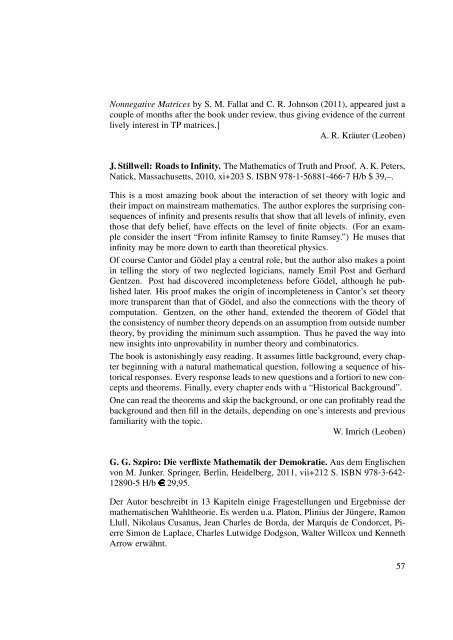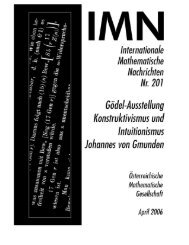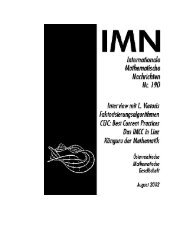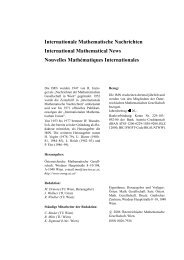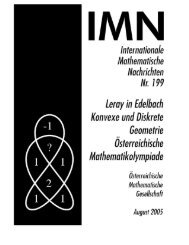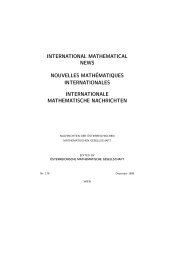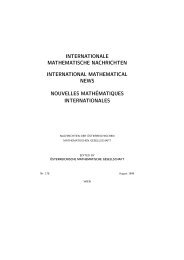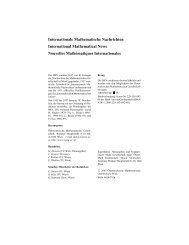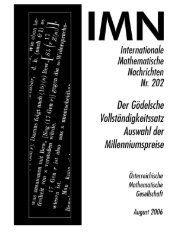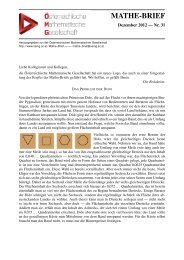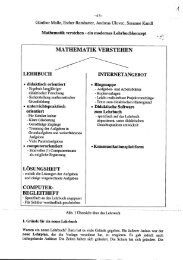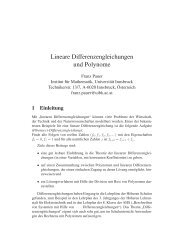218 - Ãsterreichische Mathematische Gesellschaft
218 - Ãsterreichische Mathematische Gesellschaft
218 - Ãsterreichische Mathematische Gesellschaft
Erfolgreiche ePaper selbst erstellen
Machen Sie aus Ihren PDF Publikationen ein blätterbares Flipbook mit unserer einzigartigen Google optimierten e-Paper Software.
Nonnegative Matrices by S. M. Fallat and C. R. Johnson (2011), appeared just a<br />
couple of months after the book under review, thus giving evidence of the current<br />
lively interest in TP matrices.]<br />
A. R. Kräuter (Leoben)<br />
J. Stillwell: Roads to Infinity. The Mathematics of Truth and Proof. A. K. Peters,<br />
Natick, Massachusetts, 2010, xi+203 S. ISBN 978-1-56881-466-7 H/b $ 39,–.<br />
This is a most amazing book about the interaction of set theory with logic and<br />
their impact on mainstream mathematics. The author explores the surprising consequences<br />
of infinity and presents results that show that all levels of infinity, even<br />
those that defy belief, have effects on the level of finite objects. (For an example<br />
consider the insert “From infinite Ramsey to finite Ramsey.”) He muses that<br />
infinity may be more down to earth than theoretical physics.<br />
Of course Cantor and Gödel play a central role, but the author also makes a point<br />
in telling the story of two neglected logicians, namely Emil Post and Gerhard<br />
Gentzen. Post had discovered incompleteness before Gödel, although he published<br />
later. His proof makes the origin of incompleteness in Cantor’s set theory<br />
more transparent than that of Gödel, and also the connections with the theory of<br />
computation. Gentzen, on the other hand, extended the theorem of Gödel that<br />
the consistency of number theory depends on an assumption from outside number<br />
theory, by providing the minimum such assumption. Thus he paved the way into<br />
new insights into unprovability in number theory and combinatorics.<br />
The book is astonishingly easy reading. It assumes little background, every chapter<br />
beginning with a natural mathematical question, following a sequence of historical<br />
responses. Every response leads to new questions and a fortiori to new concepts<br />
and theorems. Finally, every chapter ends with a “Historical Background”.<br />
One can read the theorems and skip the background, or one can profitably read the<br />
background and then fill in the details, depending on one’s interests and previous<br />
familiarity with the topic.<br />
W. Imrich (Leoben)<br />
G. G. Szpiro: Die verflixte Mathematik der Demokratie. Aus dem Englischen<br />
von M. Junker. Springer, Berlin, Heidelberg, 2011, vii+212 S. ISBN 978-3-642-<br />
12890-5 H/b 29,95.<br />
Der Autor beschreibt in 13 Kapiteln einige Fragestellungen und Ergebnisse der<br />
mathematischen Wahltheorie. Es werden u.a. Platon, Plinius der Jüngere, Ramon<br />
Llull, Nikolaus Cusanus, Jean Charles de Borda, der Marquis de Condorcet, Pierre<br />
Simon de Laplace, Charles Lutwidge Dodgson, Walter Willcox und Kenneth<br />
Arrow erwähnt.<br />
57


